Hittin' the “books”
*Ceci est seulement disponible en anglais
November 22, 2019 - For some post-secondary students, school isn’t just an hour away, but several time zones away. This means travelling across the globe before hittin’ the books.
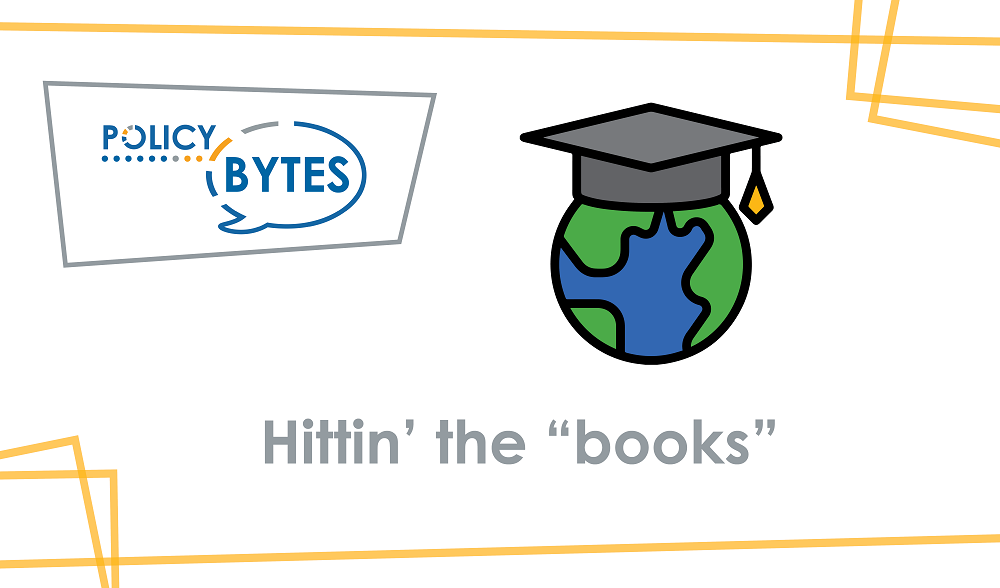
International students have many socio-economic impacts. Not only are classrooms and communities further enriched through diversity, but they play an important economic development role. Indeed, they are a potential source of skilled labour and they also inject money into the local economy by paying for rent, groceries, clothing, tuition, etc. Speaking of tuition, international students pay more than domestic students - in some cases a lot more. This is a growing source of university revenue, leading some to conclude that at the national-level, revenue from international student tuition is replacing declines in government funding. But is this the case in Northern Ontario?
Indeed, international students pay higher tuition; the average Ontario international undergraduate student in Ontario pays about five times as much as their domestic counterparts. However, this statistic is lower for Northern Ontario universities. International undergraduate tuition ranges between 3.6 (Laurentian) and 1.1 (Hearst) times more than domestic undergraduate student tuition (Figure 1). Notably, all northern universities are below the provincial average. However, in comparison to selected universities in the Atlantic provinces like University of Prince Edward Island and Cape Breton University, a northern education is often more expensive, relative to domestic student prices.
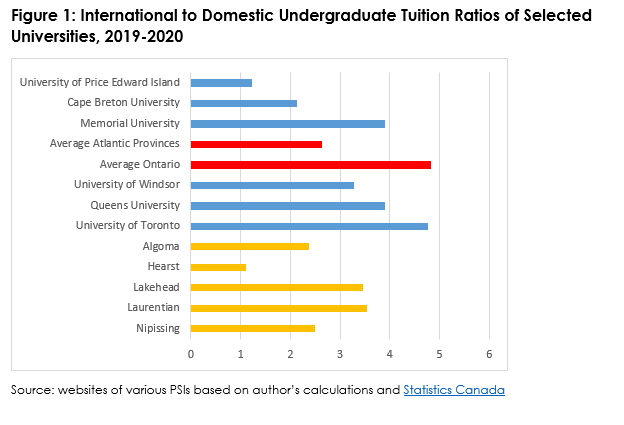
It is not wrong to say that international students generate a growing amount of revenue for universities. Across the country, tuition rates for both domestic and international students have increased in recent years. And, as shown in below Figure 2, the number of international students at some northern universities is rising.
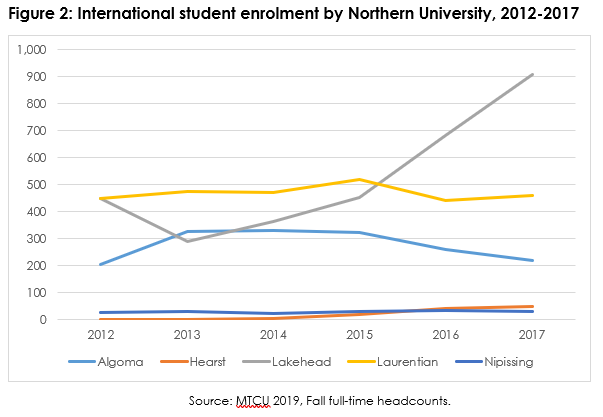
However, it is not necessarily true that this revenue is subsidizing budgets. While this may be true at a national-level, provincial funding to northern universities has stayed relatively stable since 2010 (Figure 3). Thus, it would be unfair to say that northern universities are off-setting a decline in government funding with international student tuition.
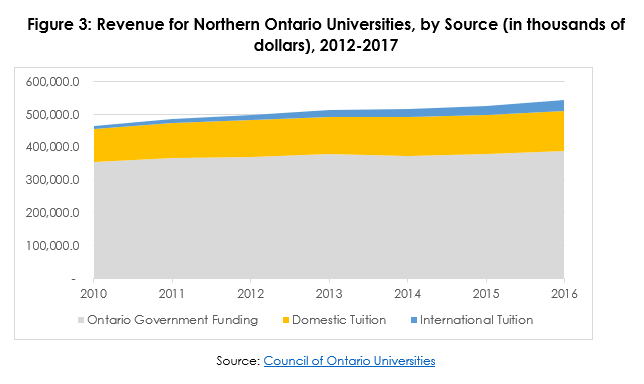
But, it is important to note that funding is different for northern universities in Ontario. Many universities in the south receive large grants from donors and specific government ministries. In the North, this is not the case. In fact, northern universities in comparison receive very little funding from these sources. However, there are specific special purpose grants for northern universities, which is currently added on top of the base funding that all universities receive.
Yet, the rates of international student tuition may still be a problem. Unlike domestic students, there are virtually no regulations on international student tuition rates. What this means is that international students have almost no way of predicting what their next year’s tuition will be. While domestic students also pay increasing tuition, the increases are limited to 3 per cent annually, but this is set to change in the near future. While some support systems and scholarships are available, international students do not receive provincial and federal funding to offset their tuition the way domestic students do.
Why does this matter? Should Northerners care if international students pay high tuition? The answer is yes.
The North needs students to stay, work, and live here, and high tuition rates may be a poor strategy for post-graduation retention. Students who are able to travel abroad and pay high tuition rates are likely to be wealthy.[1] As such, wealthy international students may have plenty of economic opportunities back home.[2] This could mean that these students are less likely to stay in Canada after graduation.[3] But international students of lower socio-economic backgrounds may be more likely to stay. In fact, a national study of international students found that the two main motivations for students to stay in Canada were: better job opportunities and better standard of living than that in their home country.
For areas facing population decline, retaining international students post-graduation is important to a region’s growth and prosperity. As potential immigrants, international students have recognized educational credentials, knowledge of English or French, Canadian work experience and references, familiarity with Canadian culture, and connection to the community. For these reasons, international students are expected to integrate quicker into the labour market and society than other types of immigrants.
The fact is that some foreign students stay in the North after they graduate, and some do not. So, how could universities help by targeting those that are more likely to stay? Northern universities could consider lowering international student tuition fees. Because northern universities receive little revenue for international students (figure 3), relatively speaking, lowering international tuition fees could increase much-needed post-graduation retention at little revenue loss on the books.
If the North is serious about combatting population decline, international students should be part of the solution. And lowering international tuition may be part of a strategy for increasing international student retention.
[1] Century Initiative. 2019, June 20. “Scaling International Education”. Toronto, ON: Century Initiative.
[2] Ibid 2019
[3] Ibid 2019
Hilary Hagar was a Summer Policy Analyst at NPI.
Thank you to our Experience North Sponsor 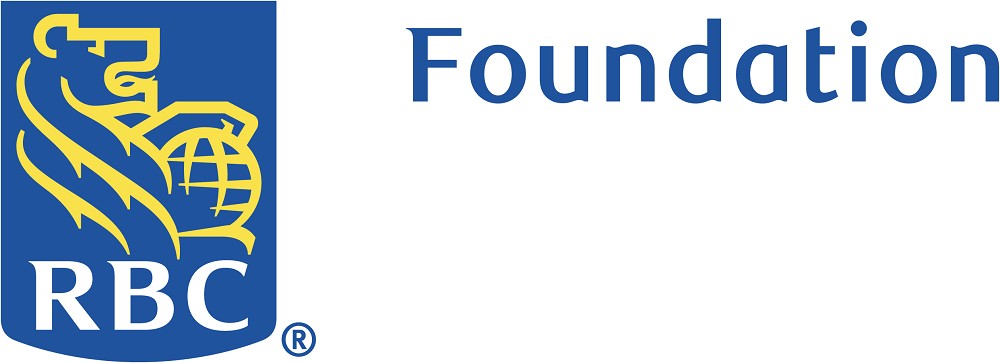
Le contenu du Puces Politiques du Nord est pour l’information et l’utilisation générales. Les vues exprimées dans ce blogue sont celles de l’auteur et ne reflètent pas nécessairement les opinions de l’Institut des politiques du Nord, de son conseil d’administration ou de ses partisans. Chaque auteur assume toute la responsabilité quant à la précision et à l’intégralité de son blogue. L’Institut des politiques du Nord ne sera pas tenu responsable d’une erreur ou d’une omission dans cette information, ni d’un dommage causé par l’exposition ou l’utilisation de cette information. Tout lien vers un autre site Web ne signifie pas que l’Institut des politiques du Nord est d’accord avec le contenu de ce site, ni qu’il y assume une responsabilité.
L’Institut des politiques du Nord vous invite à lui faire part de vos observations et commentaires. Cette rétroaction ne doit pas dépasser 500 mots. Nous ne publierons aucun commentaire comportant des propos obscènes, désobligeants, haineux ou menaçants. Évitez le hors sujet en vous assurant que vos commentaires concernent les thèmes abordés dans ce blogue. Si vous présentez une réfutation ou un contre-argument, veuillez fournir des sources et des éléments de preuve. L’Institut des politiques du Nord se réserve le droit de refuser les rétroactions et commentaires transmis à www.northernpolicy.ca qui contreviennent aux présentes directives.
